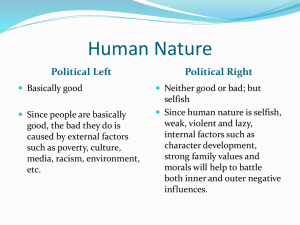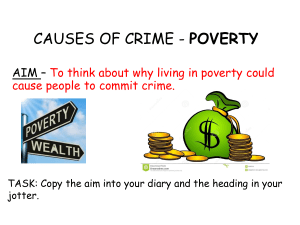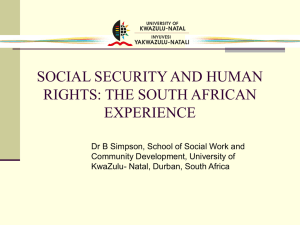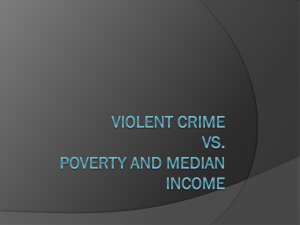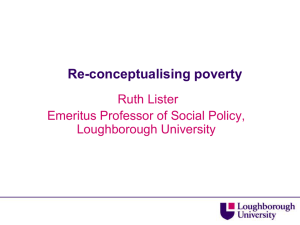Examples of categories and keywords
advertisement
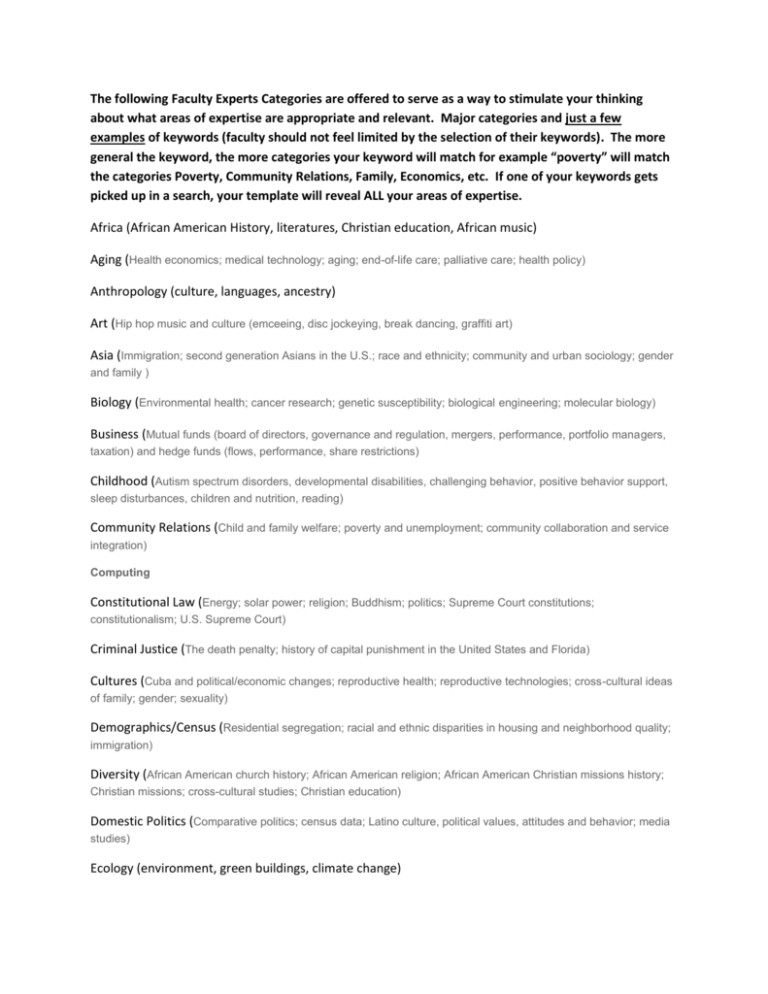
The following Faculty Experts Categories are offered to serve as a way to stimulate your thinking about what areas of expertise are appropriate and relevant. Major categories and just a few examples of keywords (faculty should not feel limited by the selection of their keywords). The more general the keyword, the more categories your keyword will match for example “poverty” will match the categories Poverty, Community Relations, Family, Economics, etc. If one of your keywords gets picked up in a search, your template will reveal ALL your areas of expertise. Africa (African American History, literatures, Christian education, African music) Aging (Health economics; medical technology; aging; end-of-life care; palliative care; health policy) Anthropology (culture, languages, ancestry) Art (Hip hop music and culture (emceeing, disc jockeying, break dancing, graffiti art) Asia (Immigration; second generation Asians in the U.S.; race and ethnicity; community and urban sociology; gender and family ) Biology (Environmental health; cancer research; genetic susceptibility; biological engineering; molecular biology) Business (Mutual funds (board of directors, governance and regulation, mergers, performance, portfolio managers, taxation) and hedge funds (flows, performance, share restrictions) Childhood (Autism spectrum disorders, developmental disabilities, challenging behavior, positive behavior support, sleep disturbances, children and nutrition, reading) Community Relations (Child and family welfare; poverty and unemployment; community collaboration and service integration) Computing Constitutional Law (Energy; solar power; religion; Buddhism; politics; Supreme Court constitutions; constitutionalism; U.S. Supreme Court) Criminal Justice (The death penalty; history of capital punishment in the United States and Florida) Cultures (Cuba and political/economic changes; reproductive health; reproductive technologies; cross-cultural ideas of family; gender; sexuality) Demographics/Census (Residential segregation; racial and ethnic disparities in housing and neighborhood quality; immigration) Diversity (African American church history; African American religion; African American Christian missions history; Christian missions; cross-cultural studies; Christian education) Domestic Politics (Comparative politics; census data; Latino culture, political values, attitudes and behavior; media studies) Ecology (environment, green buildings, climate change) Economics (U.S. universities; U.S. patent policy; biotech entrepreneurship; economic sociology, poverty) Education (Classroom assessment; including rubrics; formative assessment; performance assessment; selfassessment; self-regulated learning) Emergency Preparedness (Homeland security; infrastructure protection; intelligence; counter-terrorism and terrorism interdiction; information sharing; weapons of mass destruction; critical decision making; facility and systems security;;emergency preparedness) Energy (Human health effects of environmental contaminants, including metals and organic compounds.) Engineering (bioengineering, marine ecology, coastline, chemical engineering, electrical engineering, computing, automation, mechanical systems) Environment (Urban planning; regional planning; urban development; urban renewal; community development; housing policy; neighborhood decline; neighborhood revitalization; abandoned buildings; fire tragedies; microenterprise; micro-credit; retail markets; street vendors) Ethics (Bioethics and health policy; stem cell research; research with human subjects; reproduction and genetics) Family (Social welfare policy; history and services; poverty; child welfare; cultural competence) Florida (Florida economy, History of Miami art) Gay & Lesbian Issues (Lesbian, gay, bisexual and transgender (LGBT) people; transsexuality; gender; marriage and family issues; parenting; adoption; youth) Global Warming (Energy, oil drilling, rain forest, environment) Government (Managing and preserving government electronic information; assessing the value of government information technology investments; Cross-boundary and multi-organizational information sharing in government) Health (Eating disorders; anorexia; bulimia; binge eating; body image; obesity; weight loss; dieting; psychology; mental health) Higher Education (U.S. universities; U.S. patent policy; biotech entrepreneurship; economic sociology) History (Witchcraft; Salem witch trials; early modern Britain; economic history; gender, civil war, revolution) Homeland Security (Information security; hacking; computer forensics; information security risk analysis; biological models for security; wireless security; botnets (zombie computers); nanosensor networks; self-organizing systems complexity; optimization; information security education) Homelessness (poverty, child welfare, economics, housing) Human Rights (20th century U.S. history; 20th century politics and public policy in the U.S.; history of refugees and immigrants in the U.S.; history of the U.S. and human rights; history of American foreign policy) Information Technology (Network communications; wireless communication; network security; network science; quantum computation and communication) International Politics (Balkans (Croatia, Serbia, Bosnia-Herzegovina, Kosovo); Politics; Comparative Legislative Development; Foreign Assistance; Peace Operations and Post-Conflict Reconstruction) International Relations (Balkans (Croatia, Serbia, Bosnia-Herzegovina, Kosovo); Politics; Comparative Legislative Development; Foreign Assistance; Peace Operations and Post-Conflict Reconstruction) Interpersonal Relationships (Evolution and behavior; human reproductive competition; biology of interpersonal attraction; semen chemistry and behavior; brain evolution; voice attractiveness; body morphology and behavior; yawning; grip strength; kissing; paternal assurance tactics) Journalism (Popular culture; children, youth, and media; news; mass media effects; film; work; internships) Judaism (Holocaust; modern Jewish history; antisemitism; Yiddish) Language (Literatures, cultures, and language issues of the Francophone areas of the world, particularly West Africa, the Caribbean (Haiti, Martinique, Guadeloupe), and North America (Quebec, New England, Louisiana); cinema of Francophone West Africa, Caribbean and Quebec) Latin America (Language; bilingualism; English-only movement; Native American languages; gay and lesbian language; linguistic discrimination; English language usage; language endangerment) Law (Temperance movement; crime and trials; civil liberties) Literacy (Literacy instruction; literacy/social studies; connections; Teacher Education Accreditation Council (TEAC)) Literature (Contemporary literature, especially poetry and poetics, of the U.S., U.K., Europe, North Africa, and beyond; theory of the avant-garde and diaspora studies; comparative literature and translation studies; North African culture) Logistics (transportation, supply chain, ports) Mathematics (Algebraic combinatorics; Lie groups and Lie algebras; representation theory; Schubert calculus on flag manifolds; formal group theory with applications to algebraic topology; cluster analysis) Media (Documentary film; media; nonfiction media storytelling; archival filmmaking; historical filmmaking; independent filmmaking; screenwriting) Mental Health (Psychology; mental health issues; suicide prevention; alcohol and other drug abuse prevention in college students; peer counseling and peer education; college student hotlines; peer theater programs; disability issues) Minorities (Crime and mass media/popular culture; crime history; race, gender, crime; crime and detective fiction) Music (Choral music; chorus; choir) Nanotechnology (Lithography; extreme ultraviolet (EUV) lithography; optics contamination; mass spectrometry; plasma light source; microscopy; x-ray microscopy; magnetic materials) Parenting (Reproductive health; family planning; adolescent pregnancy; sexuality; maternal & child health; breastfeeding promotion; preventive medicine; public health) Philosophy (Mythology and gender studies; cultural studies; interpersonal relationships) Popular Culture (Crime and mass media/popular culture; crime history; race, gender, crime; crime and detective fiction) Poverty (economics, homelessness, child welfare, race, census data) Psychology (School psychology; developmental psychopathology; behavioral interventions; consultation and prevention, and cognitive-behavior therapy for children and adolescents) Public Health (Urban, city, district, and regional planning; anthropology; economics; public health) Public Policy (Fiscal health; policies of states) Religion (Buddhism; religion) Sexuality (Sexuality; sexual health; sex education; European approaches to sex education; AIDS/HIV; sexually transmitted diseases and infections; adolescent sexuality; Internet pornography) Sports (Baseball and film) Students (Psychology; mental health issues; suicide prevention; alcohol and other drug abuse prevention in college students; peer counseling and peer education; college student hotlines; peer theater programs; disability issues) Substance Abuse (Substance abuse; co-occurring disorders; impact of adverse childhood experiences; homelessness; aging; meditation interventions; integrative service system responses; Integral Restorative Processes (IRP)) Supreme Court (Court systems, especially the federal courts; U.S. Supreme Court; appellate courts; court administration; judicial selection; litigation by interest groups; civil liberties; civil rights; First Amendment.) Technology (Network communications; wireless communication; network security; network science; quantum computation and communication) Terrorism (Sanctions; proliferation issues; terrorism) Theatre (Documentary film; media; nonfiction media storytelling; archival filmmaking; historical filmmaking; independent filmmaking; screenwriting) Urban (Urban, city, district, and regional planning; anthropology; economics; public health) Violence (Guns; gun control; statistics and quantitative research methods; patterns of firearms ownership and use; juvenile delinquency; victimization) Welfare (Child and family welfare; poverty and unemployment; community collaboration and service integration) Women's Issues (Women in science; women in mathematics; minorities in science; people of color in science; mathematics education; diversity equity in education; postgraduate education; statistics in the media; statistical literacy) Workplace (Job design; performance appraisal; compensation and benefits; Human Resource Information Systems)
